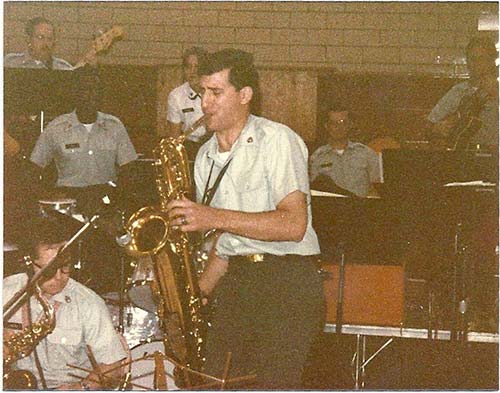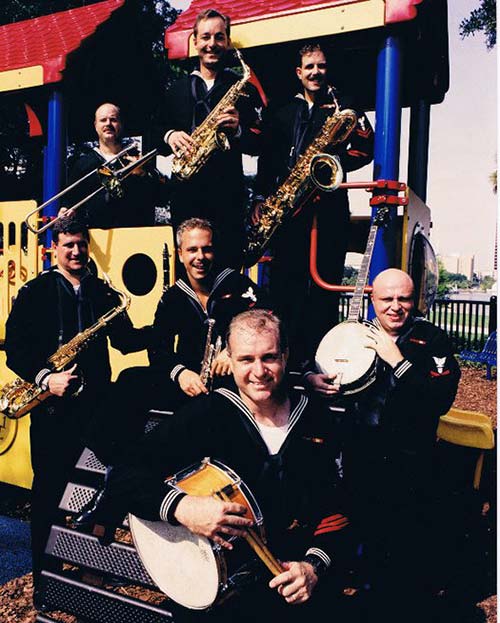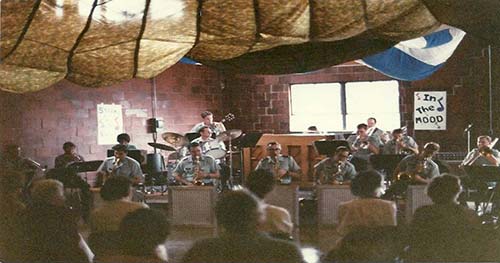Alternative Ways to Make a Living Playing the Sax – Part 1: Military Bands
 This article will cover the topic of auditions and the various job opportunities for saxophone players. I will touch on the military fleet, field and regional bands of the Navy, Army, Marines and Air Force. In addition I will discuss opportunities with the cruise lines via auditions with Pro Ship. Lastly I will discuss the Socialist Music System in Germany and Western Europe through information that was sent to me from the WDR Big Band in Germany.
This article will cover the topic of auditions and the various job opportunities for saxophone players. I will touch on the military fleet, field and regional bands of the Navy, Army, Marines and Air Force. In addition I will discuss opportunities with the cruise lines via auditions with Pro Ship. Lastly I will discuss the Socialist Music System in Germany and Western Europe through information that was sent to me from the WDR Big Band in Germany.
Okay, so here you are, Joe or Jane sax player getting ready to graduate college with either a performance degree or a music education degree at either the undergraduate or graduate level. Let us assume that for the time being you do not want to teach, that you want to play and travel. After all you are in your early to mid-20’s and you have your whole life ahead of you.
Perhaps you are thinking, “well I’ll just get a job playing with one of the big bands that are still around.”
First off there are not that many big bands still around. Second, usually those jobs are word of mouth gigs. The exception is the Glenn Miller Band which does post openings on their website.
Navy Fleet Band Auditions
We will start with the US Navy because that is where I spent most of my career although I was also in the Army Band at Ft. Carson for 3 years right after college. Here is the Navy Fleet Band process. If you go to www.navyband.navy.mil/auditions.html, you will see which openings there are, along with a link to information such as a required piece and excerpts you must learn at specific metronome markings. In addition to the required piece and the excerpts, there will be plenty of sight reading. You will not play scales, they assume you know your scales. If you want to schedule an audition there is a form to fill out at the bottom of your excerpts. Also you may call the Audition Supervisor at 901-874-4316.
The Navy is really trying to get the best college players they can. They seem to be leaning more toward classical players these days. However there is still room for the jazz/commercial player in the jazz combo, brass band and rock band. So with these ensembles you have room for three sax players. All the rest of the sax players will be in ceremonial band and parade band. If you are lucky you may be able to form a sax quartet.
Doubling between sax, clarinet or flute is no longer required. I must warn you, the Navy has changed. To audition you must go to Millington, TN where the Navy Music Program is headquartered. Then you must stay at a hotel/motel. All of this is at your own expense. You can no longer go to your local band to audition. Despite stories you may have heard about legendary Navy Big Bands, Show Bands, Variety/Dixieland Bands and Concert Bands, those days are over except for the US Navy Band in Washington DC.
The size of Navy Bands has also been reduced. This makes it more competitive to get into the band field. For example the Norfolk Band and the Naval Academy Band have been reduced from 60 musicians to 35 musicians. A 35 piece band will consist of a Parade Band, Ceremonial Band, Woodwind Quintet, Brass Quintet, Brass Band ala Dirty Dozen, Rock Band and a Jazz/Reception Combo to play background music at receptions. If they need a big band or show band for a one time gig they will just pool everyone together, do the gig and then disband the group until the next time.

The Army Band Program
As stated above I was in the Army Band at Ft. Carson, CO right after I graduated from Towson University. The Army’s audition process has also changed. However they are still doing Big Bands, Jazz Combos, Dixieland Groups, Rock Band, Concert Band/Pop Concerts, Top-40 Bands and ceremonial and/or marching bands. They are even putting out some heavy metal groups to play for the younger troops that are deployed in various war zones.
Here are the Army Band’s audition requirements for their field bands. You will be working with an Army Music Audition Coordinator, a recruiter and a band liaison. Your audition day has come, here is what to expect:
Part 1: You will be given a package of ceremonial music before your audition. You must prepare this prior to your audition. You can expect to see various marches in both Cut Time and in 6/8. You may have your part to the National Anthem, the General’s March, National Emblem etc.
Part 2: This is your chance to show off your talent and skills. You need at least three selections of contrasting styles to highlight your technic, musical and stylistic ability. These pieces can be excerpts from solo literature like the Ibert, concert band, orchestral literature or from jazz or pop selections. For example, you could play Phil Woods alto solo from Billy Joel’s “Just The Way You Are.” Sax players are encouraged to demonstrate both classical and jazz styles during part 2 of the audition. So you may play a Voxman Study and then a Greg Fishman Jazz Etude. You may ask your band liaison for suggestions and discuss what is appropriate music for this part if necessary. Sax players, I suggest you bring both a classical and jazz setup to the audition. Use the appropriate mouthpiece for the appropriate style. For ceremonial music you could use either mouthpiece. Ceremonies are often performed out on a field, so some carrying power is helpful. Do not play any mouthpiece that you cannot control and sound good on.
Part 3: This is the music preparation part. They want to see how quickly you can prepare music if you are called on to sub on a gig with short notice. So the night before your audition, your band liaison will send you some music that needs to be prepared before your audition.
Part 4: If you have any additional skills this is the time to show them off. You may receive extra points on your audition if you can demonstrate doubling, singing or improvisation skills. Talk with your band liaison to see what would be appropriate to prepare.
Preferred Education/Experience:
- Ten plus years of playing experience
- Bachelors degree in performance or education
- Professional performance experience, the bottom line is, can you play well and prepare new music quickly.
For more information and to fill out the audition request form go to www.music.army.mil and follow the prompts.
The Marine Band Program
The audition requirements for the Marine Band Program are straight forward. You will be asked to play major scales and all three forms of minor scales at random. You will also be asked to play audition excerpts and do an Initial Strength Test. Then you will play a prepared piece. To see some suggestions of prepared pieces by instrument go to http://www.marines.com/becoming-a-marine/enlisted/musician-enlistment-option-program.html. If by the time you read the article this link has changed, you can also simply search for “MEOP” or “Musician Enlistment Option Program” to get more information about going this route.
After your prepared piece you will do sight reading. Unlike the other services, the Marines do not offer a college student loan repayment plan. They seem to be geared toward getting the best high school level players they can. I talked to a Marine Band Recruiter and he left me with the impression that they really are not trying to compete with the Army, Navy and Air Force for the best college/post college players that they can get. This recruiter said that the retention rate in the Marine Band Field is only 15%. Remember in the Marine Band you must be a Marine first. In the Navy the retention rate hovered around 90% when I was in between 1988 to 2005. When I was in the Army the retention rate was high but probably closer to 75% to 80%.
The Air Force Regional Bands
Step One: Contact the band holding the audition and send the required material.
Step Two: A recruiter will contact you for an in person pre-screening interview. This will decide if you are eligible to enlist in the Air Force.
Step Three: If you pass the interview you are invited to a live audition which you will travel to at your own expense. At the audition you will be asked to play various prepared pieces. You will sight read and you will demonstrate your ensemble skills. So you will be sitting in with various groups at your audition. The Air Force basically has the same kind of groups as the Army, so they are still doing big band and concert band.
Steps Four and Five: If you are the winner of the competitive audition then the recruiter will process the necessary forms. After that you are off to Basic Training.
How I Prepared for my Army and Navy Band Auditions
- I had all my major and all 3 forms of my minor scales down cold. Even though they are not required for the Navy audition today they may be required at your future auditions at the Armed Forces School of Music.
- I had my prepared piece ready to go. Today the Navy will tell you what piece you need per audition. The other branches will let you choose your own piece as long as it is a certain grade level.
- Next I practiced sight reading. This is the common skill among all the auditions. So how did I do this?.
- I got a hold of the Fillmore March Book, The Pass In Review March Book and some Sousa Marches for my instrument. Sax players get both the 1st Alto and Tenor Sax Books. The tenor part is with the low brass so those parts are not to hard. The 1st Clarinet parts can be very hard. Some marches to go over are American’s We, The Klaxon, The Footlifter, King Cotton, Semper Fidelis, Liberty Bell
- I had my parts to various Concert Band pieces like the First Suite in Eb by Holst, Festive Overture by Shostakvich, (f you play clarinet like I did make sure you can play the solo at tempo after rehearsal # 4), Overture To Candide by Bernstein and Folk Song Suite by Raph Vaughan Williams. I went over them and made sure I could play them, especially the solo and exposed parts.
- I would start at the beginning and play WITHOUT STOPPING. Make a mistake, keep going, just do not lose the TEMPO or go out of TIME. Now go back and clean up your mistakes. Read the music again and move on to the next piece. If you stop during an audition you are sunk. Pick any music, some at your level, some just below your level and read, read read.
- For saxophone, here are some great books to use. Technique of the Saxophone Rhythm Studies by Joe Viola of the Berklee Press. Section I provides rhythmic reading experience. These are in duet form so play both parts. Section II uses music in simple and compound meters. They start out as short pieces and gradually get longer and harder. Section III are double time exercises. Remember, read it the first time, then go back and clean it up, play it again and put it away. Section IV are Etudes in various meters and styles. A jazz feel is used in this book. Each day pick one or two pages from each section.
- I practiced improvisation with my Aebersold’s. I had the tune I was going to play down really well.
- I also practiced reading out of the harder Lennie Niehaus Jazz Conception Etude and Duet Books. The same is true for the Greg Fishman series of Etudes and Duets. For the classical side go through some Ferling etudes, sight read some of the Voxman Studies
The Air Force mainly recruits college educated players and just does “on the job training” for marching band and other subjects. The Air Force basically does the same ensembles that the Army does. I am not sure about their retention rate. For more information go to www.music.af.mil/careers/.
The Perks of Military Bands
- All the branches offer college loan repayment up to $65K except the Marines which offers zero college loan repayment.
- You will travel and meet interesting people. You may even meet your spouse while traveling. A lot of guys get married to girls from Europe, Japan, and Korea while stationed in bands there.
- BAH which means Basic Allowance for Housing, this is tax free money which is given by rank. BAS which means Basic Allowance for Subsistence or food. This is also tax free.
- Your regular pay by rank. This is taxed. Right to use the exchange, grocery store etc all tax free. Thirty days paid leave per year, pension plan, thrift savings plan, free medical care for you and your family, free dental care for you.
- The Montgomery GI Bill and the Post 9/11 GI Bill. (I used the Post 9/11 GI Bill to earn my Masters Degree).
- There is a very reasonable medical plan and dental plan when you retire, it is like a HMO.

Things To Consider
- You must maintain your physical fitness. You will have a physical fitness test twice a year. If you are out of shape, not within the weight standards then in order to enlist you must get in shape. You must be able to do push-ups, crunches and run two miles. The standard is set by your age so a 20 year old must run faster than a 45 year old member. The Marines require you to do pull ups in addition to the other events above.
- You will be subject to random drug screenings where you have to go in a bottle under the observation of a senior person. So if you are shy about this, the military is not for you.
- There is discipline and structure, you must follow the orders of those over you in the chain of command even if that person has less education than you.
- You must play the music assigned, you do not have a choice of the music played unless you are the leader.
- You will have secondary duties such as working in the library, supply room, or cleaning the head (bathroom). The lower the ranking you are, the more likely that you will have the dirty work of keeping the band room clean.
- You can gig, teach or go to school after hours if the schedule permits it.
- You will transfer every three to four years.
Promotion
There are promotion tests. Ask a current band member about them. However from my experience the best promoting branches for the band are the Army then the Marines. Promotion in the Navy can be very slow, the same is true for the Air Force.








March 27, 2018 @ 10:52 am
The photos: # 1 I am playing the bari solo on the Buddy Rich version of “Mercy, Mercy, Mercy” at some high school in Minnesota.
# 2 the infamous TGIF fast attack Variety/Dixie Band. I am the tenor sax/clarinet player. This band was one of my favorites. We played at retirement homes, schools, for handicapped kids etc. This is a band that did a lot of Good and helped to repair the world. These guys were a bunch of characters. We also functioned independently from the rest of the band on road trips. We even had our own van and would go out together after gigs.
# 3 Myself posing at Mt. Rushmore near Rapid City, South Dakota. Then in front of our Band Bus. We had the same driver for all of our trips a guy named Bill. He took a lot of my Army Band photos. The uniform I am wearing is the old Army Band Blues. Because of the shoulder boards it confused a lot of people. People thought we were officers and would salute us. Of course we would return the salute to further confuse them. The Army changed this uniform so now the band members have their rank on their sleeves.
# 4 Part of the Fleet Jazz Ensemble either before or after a concert in Norfolk, VA. Reading from left to right. Michael Wells; keyboard, Jason Robertson; drums, Clint McClanahan; electric bass, myself, Larry Weintraub on bari sax.
# 5 The Ft.Carson Big Band playing at the Glenn Miller Festival in Clarinda, Iowa. I am the tenor sax player to the far left as you look at the picture. I am just to the right on the trpts. This was a Great Trip. Clarinda, Iowa is Glenn’s home town. On this trip we went from 1981 to 1940. We drove up to the old Denver Airport in Aurora, CO. Took a plane to Omaha, NE. Then we got on a bus bouncing along the Iowa countryside until we got to Clarinda after several hours. Down the street from our motel was an A & W Drive – In complete w/car hops although not on roller skates.
To me the best part of being in a military band was the travel, the people you meet, the groups I played in and people I played with (for the most part).
Thanks for reading, stayed tuned for Part 2. Remember if you have questions e-mail me at LWeintraub1@cox.net
March 27, 2018 @ 7:24 pm
One amendment to the Navy audition procedure that is not on their website. However in an e-mail to me the Audition Supervisor said that “after they do open call auditions in Millington, TN and they still cannot find a qualified person, then they will do local auditions by appointment.” The question is, do you really want to take the chance of them auditioning say 25 sax players for say maybe 4 spots and then making an appointment at your local Navy Band or would you rather be at the audition in Millington, TN just knowing that you are going to Wow them?
March 28, 2018 @ 9:23 pm
Great srticle Larry!
March 29, 2018 @ 11:16 am
Thanks Paul. Hope your well!!
April 6, 2018 @ 10:38 pm
Hi i am a one year in sax player and im wondering if anybody can have suggestions for me to improve?
http://www.youtube.com/watch?v=wD8itc7_wVY
April 7, 2018 @ 3:25 pm
Find a good teacher either at a local college or music store and practice, practice, practice.
May 2, 2018 @ 1:17 pm
Good information in both articles Larry. It will be very useful to those seeking performance opportunities.
May 2, 2018 @ 2:33 pm
Dino: Thanks, that is why I wrote it. Fyi – Dino is another sax player I know from the Navy Band in Orlando, FL.